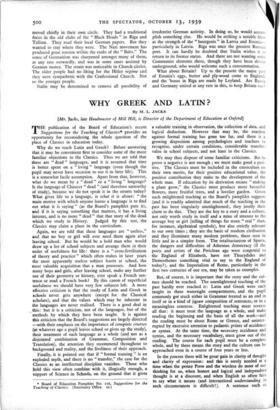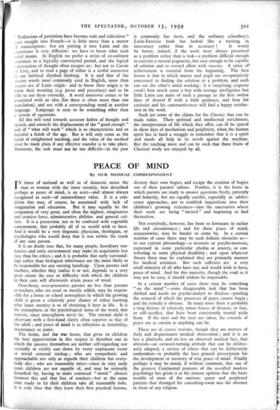WHY GREEK AND LATIN ?
By M. L. JACKS
[Mr. lacks, late Headmaster of Mill Hill, is Director of the Department of Education at Oxford] THE publication of the Board of Education's recent Suggestions for the Teaching of Classics* provides an opportunity for reconsidering the whole question of the place of Classics in education today.
Why do we teach Latin and Greek? Before answering that it may be convenient first to consider some of the more familiar objections to the Classics. Thus we are told that these are " dead " languages, and it is assumed that time is better spent on a " living " language (even though the pupil may never have occasion to use it in later life). This is a somewhat facile assumption. Apart from that, however, what do we mean by a " dead " or a " living " language? Is the language of Chaucer " dead " (and therefore unworthy of study), because we do not speak it in the streets today? What gives life to a language, is what it is about: " the main motive with which anyone learns a language is to find out what it is saying " (as the Board's pamphlet puts it), and if it is saying something that matters, it has a living interest, and is no more " dead " that that story of the dead which we study in History. Judged by this test, the Classics may claim a place in the curriculum.
Again, we are told that these languages are " useless," and that no boy or girl will ever need them again after leaving school. But he would be a bold man who would draw up a list of school subjects and arrange them in their order of usefulness for life: there is a " cross-fertilisation of theory and practice " which often makes in later years the most apparently useless subject learnt at school, the most valuable acquisition that a man possesses. And how many boys and girls, after leaving school, make any further use of their geometry or history, ever speak a French sen- tence or read a French book? By this canon of superficial usefulness we should have very few subjects left. A more effective criticism is that the study of Latin and Greek in schools never gets anywhere (except for the Classical scholars), and that the values which may be inherent in the languages are never realised. There is a good deal in this: but it is a criticism, not of the languages, but of the methods by which they have been taught. It is against this criticism that the Board's suggestions are largely directed —with their emphasis on the importance of complete courses (at whatever age a pupil leaves school or gives up the study), their treatment of each language as a whole (and not as a disjointed combination of Grammar, Composition and Translation), the attention they recommend throughout to background and reality, and the liveliness of their approach.
Finally, it is pointed out that if " formal training " is an exploded myth, and there is no " transfer," the case for the Classics as an intellectual discipline vanishes. Those who hold this view often combine with it, illogically enough, a support of Science in Schools, on the ground that it gives
* Board of Education Pamphlet No. 116, Suggestions for the Teaching of Classics. (Stationery Office. is.)
a valuable training in observation, the collection of data, and logical deduction. However that may be, the reaction against formal training has gone too far, and there is a growing disposition among psychologists and teachers to recognise, under certain conditions, considerable transfer- value in school subjects, and not least in the Classics.
We may thus dispose of some familiar criticisms. But to prove a negative is not enough ; we must make good a posi- tive. The Classics must be included in the curriculum on their own merits, for their positive educational value, the positive contribution they make to the development of the whole man. If education by its derivation means " making a plant grow," the Classics must produce more beautiful flowers, more fruitful trees, and a lovelier garden. Given such enlightened teaching as the Board's pamphlet suggests (and it is readily admitted that much of the teaching in the past has been singularly unenlightened), they justify their claim to do this. They are the key to a story and a culture, not only worth study in itself and a mine of interest to the average boy or girl (telling of things far more " real " than, for instance, algebraical symbols), but also strictly relevant to our own times ; they are the basis of modern civilisation and they illuminate many modern problems, there seen in little and in a simpler form. The totalitarianism of Sparta, the dangers and difficulties of Athenian democracy (if the poets and artists of the Periclean age were congenial to the England of Elizabeth, have not Thucydides and Demosthenes something vital to say to the England of today?), and the Imperialism of Rome, particularly in the first two centuries of our era, may be taken as examples.
But, of course, it is important that the story and the cul- ture should be reached. The unenlightened teaching of the past hardly ever reached it: Latin and Greek were each taught in three watertight compartments, and the pupil commonly got stuck either in Grammar treated as an end in itself or in a kind of jigsaw composition of sentences, or in a meaningless construe. Enlightened teaching must reverse all that: it must treat the language as a whole, and make reading the beginning and the basis of all the work—and the reading must be about Rome or Greece, and uninter- rupted by excessive attention to pedantic points of accidence or syntax. At the same time, the necessary accidence and syntax, and the necessary vocabulary, must grow out of the reading. The course for each pupil must be a complete whole, and by these means the story and the culture can be approached even in a course of four years or less.
In the process there will be great gain in clarity of thought and clarity of expression: and this is sorely needed at a time when the penny Press and the wireless do most of our thinking for us, when honest and logical and independent thought is at a discount, and when English so often fails to say what it means (and international understanding in such circumstances is difficult!). A sentence such as Professions of patriotism have become stale and ridiculous " .•oes straight into French—it is little more than a matter transcription: but try putting it into Latin and the experience is very different: we have to know what each word means. In English we prefer a series of co-ordinate sentences to a logically constructed period, and the logical ,:onstruction of thought often escapes us: but not so Caesar or Livy, and to read a page of either is a useful corrective to our habitual slipshod thinking. It is said that of the zo,000 words most commonly used in English, more than o,000 are of Latin origin: and to know their origin is to .
know their meaning (e.g. pecus and pecuniary) and to be able to use them correctly. A word moreover comes to be associated with an idea (for there is often more than one translation), and not with a corresponding word in another language. Language is seen to be something other than a system of equations.
All this will tend towards accurate habits of thought and speech, and towards the displacement of the " good enough " and of " what will wash " which is so characteristic and so harmful a fetish of the age. But it will only come as the result of enlightened teaching, and the value of the method must be made plain if any effective transfer is to take place. Moreover, the task must not be too difficult—in the past it commonly has been, and the ordinary schoolboy's Latin-Exercise book has looked like a training in inaccuracy rather than in accuracy ! It would be better, indeed, if the work were always presented as a problem rather than a task—a problem difficult enough to exercise a natural pugnacity, but easy enough to be capable of solution and to reward effort with success. A sense of achievement is essential from the beginning. The best lesson is that in which master and pupil are co-operatively concerned in finding the solution to a problem, and each can see the other's mind working: it is surprising (experto crede) how much sense a boy with average intelligence but little Latin can make of such a passage as the first twelve lines of Aeneid II with a little guidance, and how his curiosity and his constructiveness will find a happy satisfac- tion in the work.
Such are some of the claims for the Classics that can be made today. Their spiritual and intellectual enrichment, the interpretation of life which they offer, can ill be spared in these days of mechanism and perplexity, when the human spirit has so hard a struggle to remember that it is a spirit and needs all help in its revolt against the machine. But the teaching must and can- be such that these fruits of Classical study are enjoyed by all.











































 Previous page
Previous page